![Front Cover of A5609 (v) Diary of a voyage from London to Sydney direct, Joshua [ship]. Captain Fowler Commander, 1855. [Author unknown] donated by Mr. and Mrs. D. Morrison.](https://hunterlivinghistories.com/wp-content/uploads/2023/10/IMG_2079-768x1024.jpeg)
University of Newcastle Bachelor of Arts student, Leah Madigan, began her work integrated learning (WIL) placement in Special Collections. As one of Leah’s projects she was given the diary to digitise, to enable her to develop her research and documentation skills as well as using the book scanner and handling rare and fragile historical items.
The description in the Accession Register simply read:
A5609 (v) Diary of a voyage from London to Sydney direct, Joshua [ship]. Captain Fowler Commander, 1855. [Author unknown] donated by Mr. and Mrs. D. Morrison.
You can read Leah’s detailed report below. Her enthusiasm and diligent work, with an observational eye has helped us learn more about the provenance of one of our University’s interesting regional curiosities.
Thomas Ellis. Travel Diary 1855-1856
By Leah Madigan
This hand-written diary, from 1855-1856 tells the story of a young Thomas Ellis and his journey from London to Sydney.
The diary was donated by Mr. and Mrs. D. Morrison sometime between 1976-1977 to the University of Newcastle Archives (now Special Collections, Auchmuty Library).
Since the diary was donated, which was almost half a century ago, the author’s name had not been identified until this year.
On close examination, his name is mentioned a few times throughout his writing, and can be visibly seen on the inside back fly-leaf of the diary in one of the marbled blue circles, and with little more difficulty on the front mutilated cover of the Diary.
There is not a lot known about Thomas Ellis yet, except that he was an educated passenger, and sought to find a new start in Australia.
FULL TRANSCRIPTION
A5609 (v) Diary – AVAILABLE HERE
ORIGINAL DIARY
(A5609 (v) Diary – AVAILABLE HERE
![Inside marbled board, with "Thomas Ellis" signature in ink. [A5609 (v) Diary of a voyage from London to Sydney direct, Joshua [ship]. Captain Fowler Commander, 1855. [Author Thomas Ellis] donated by Mr. and Mrs. D. Morrison.]](https://hunterlivinghistories.com/wp-content/uploads/2023/10/IMG_4142-rotated-e1698810632890-1024x978.jpg)
The Joshua
The boat that Ellis traveled on was quite large, carrying a total of 88 passengers; 23 being cabin passengers, 37 standard passengers and 28 crew members. They took livestock with them as well as, 20 sheep, 15 pigs, about 100 fouls and 6 horses. However, due to the extreme weather, a lot of the livestock died along the way.
The ship’s name was the Joshua (804 tonnes), and it was mastered by Captain John Fowler. Here is a link to the passenger list with further information on the passengers’ names, the crew members and their roles.
Link to passengers list:
http://marinersandships.com.au/1856/01/082jos.htm
What Types of Things Did the Diary Record?
The diary contained various events, from weather updates to the documentation of poems, songs, sympathies, celebrations and traditions. Ellis’s diary starts with day one the 1st of October 1855, getting on board the ship and his experience with what life would be like for the next few months. He writes religiously every day, starting with a weather and welfare update. Unfortunately, some of the pages have been cut out of the diary, including from 30th November 1855 to the 3rd January 1856 the pages have been lost. Some pages have been left in the book as ‘loose pages’ that tell us about the last month of Ellis’ journey, passing Van Diemen’s land and making it into Sydney harbour, but most of the information between those times has been lost.

The First Song
As Ellis writes, he mentions significant landmarks along the way. Such as when they stayed at St Helen Road and were permitted, by the Captain to send letters. Ellis also documents the boats from Portsmouth that brought food and drinks for trade, this is where he wrote the first song that was sung as a cheerful way to encourage a difficult task, pulling up the anchor and getting the sails ready. It was seven verses long, mentioning places like Sydney, Melbourne, and Bombay, as well as Boston and New York. His writing here is a mixture of places they will go, could go, and have been, displayed through a cheerful relaxed tone.
Here is an excerpt from the diary, followed by the transcription.

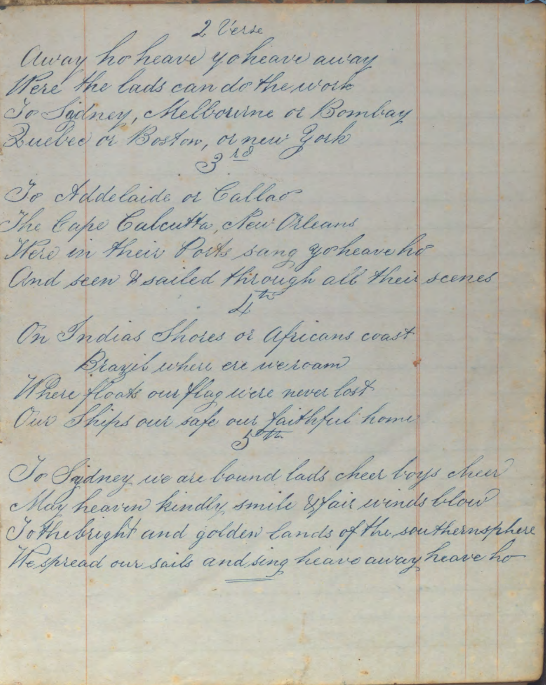
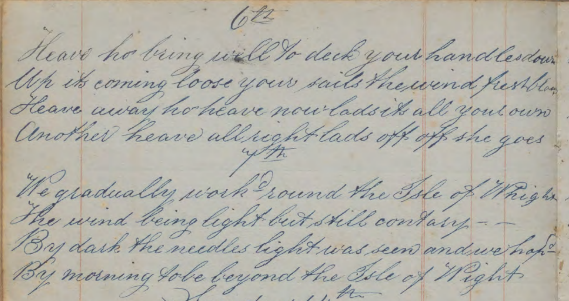
Transcription:
1 verse
Heave away heave away my lads so bold
And haul our trusty Cable in
Yo ho yo ho and from its hold
Our sturdy anchor soon we* win2 verse
Away ho heave yo heave away
Were the lads can do the work
To Sidney, Melbourne or Bombay
Quebc Or Boston, or new York3rd
To Addelaide or Callao
The Cape Calcutta, New Orleans
Were in their Ports sang yo heave ho
And seen & sailed through all their scenes4th
On Indias shores or Africans coast
Brazil where ere we roam
Where floats our flag were never lost
Our ships our safe our faithful home5th
To Sydney we are bound lads cheer boys cheer
May heaven kindly smile & fair winds blow
To the bright and golden lands of the southern sphere
We spread our sails and sing heave away heave ho6th
Heave ho bring will to deck your handles down
Up its coming loose your sails the wind fresh blow
Heave away ho heave now lads its all you own
Another heave all right lads off off she goes7th
We gradually work* around the Isle of Wright
The wind being light but still contrary –
By dark the needles light was seen and we hap*
By morning to be beyond the Isle of Wright
Use of Shorthand
Ellis uses short-hand techniques throughout his writing, which is why some words may appear to be incomplete. He uses symbols instead of writing “ed” or “and”, as well as when he writes the day, he may write the abbreviation with the symbol that represents the rest of the word. In order to keep the transcription as close to the original as possible, we have used symbols to represent how Ellis initially wrote it.
Here is an example of the abbreviations in the diary on the words ‘seem’ and ‘change’:

Transcription:
Wednesday 28th
Morning cloudy the ships course seem* chang*
It appeared to be going north of sun rising, and
We were soon told it was a foul wind – a ship
Past us to the north homeward bound – we
Seem* to go at good speed all day – but put
About ship in the evening to about south west
It was a splendid starlight night –
Ellis’s Poem
As the ship makes its way past the Eddystone lighthouse, Ellis puts his thoughts and impressions together in a poem. In this poem, he writes about the home of his father and life as he knew it. His writing here is a mixture of science, truth and hope.
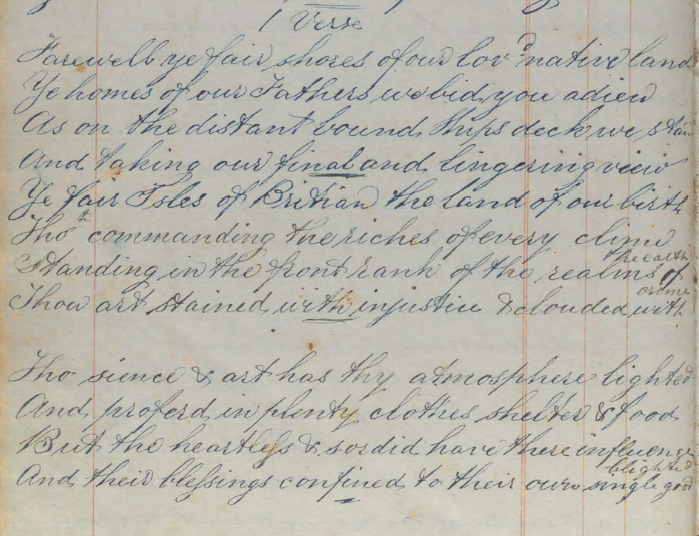
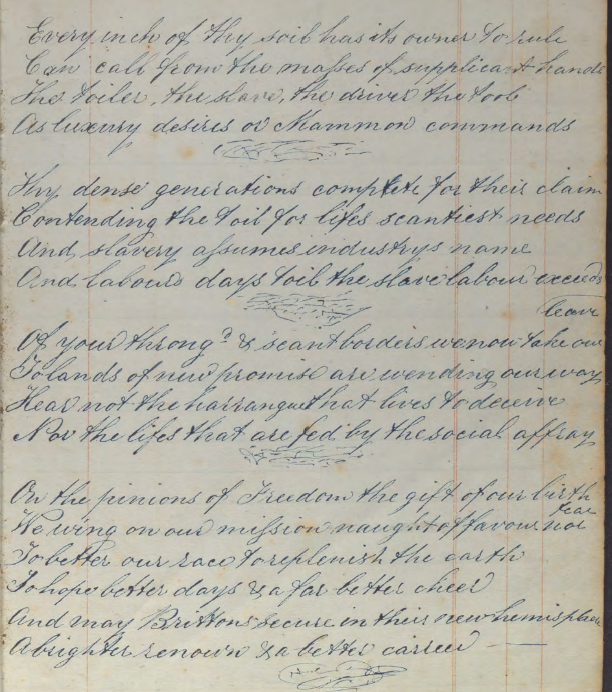

Transcription:
1 Verse
Farewell ye fair shores of our lov* native land
Ye homes of our fathers we bid you adieu
As on the distant bound Ships deck we stan
And taking our final and lingering views
Ye fair Isles of Britain the land of our birth
Tho commanding the riches of every clime
Standing in the front rank of the realms of the earth
Thou art stained with injustice relounded with arenuTho science & art has thy atmosphere lighted
And proferd in plenty clothes shelter & food
But the heartless & sordid have these influence
And their blessings confined to their own single blight* godEvery inch of thy soil has its owner to rule
Can call from tho masses of supplicant hands
The toiler, the slave, the driver the tool
As luxury desires or Mammon commandsThy dense generations complete for their claim
Contending the toil for lifes scantiest needs
And slavery assumes industrys name
And labour days toil the slave labour execsOf your throng* & seant borders we now take our leave
To lands of new promises are wending our way
Hear not the harrangue that lives to deceive
Nov the lifes that are fed by the social affrayOn the pinions of Freedom the gift of our birth
We wing on our mission naught of favours nor fear
To better our race to replenish the earth
To hope better days & a far better cheer
And may Brittons secure in their new Hampshire
A brighter renown & a better career –We appeared to make good progress during
The night and by the noise of the water and
Motion of the Ship was going a spanking pace
It was said some sail was blown away
Ellis’ Bay of Biscay Poem on the Quality of Sleep
As the ship Joshua passed the Bay of Biscay, Ellis wrote another poem about the quality of sleep that the passengers had been getting due to the weather. In the context of this poem the passengers were having a discussion about each of their predictions for the time of arrival to Sydney, many were hopeful they would arrive before Christmas. However, as we know this was not the case.



Transcription:
Here we lay all this day
In this broad biscay Bay
Rocking & roling to and fro
O the Bay of BiscayNow on waves unsteady slide
Up to its rest we lightly soar
Down in the gulph a rapid side
Just were we was beforeUp on the starboard side
A huge billow staves us
Down on the starboard side
A drowning sea laves usSlow pass* each langued how
Ruld by the passing law
That seven leagued see saw
Mocking our banguish* pourerTir* giddy and weary
So down to our mess below
Now weel endeavour to go
We reel along queery –For supper is ready
Here is beef pudding and pork
So boys to your work
Holl* steady boys steadyWe are going to old davy
The children sprawling and squling
And one loudly bawling
Oh crackey our shells full of cold coffee & gravyOur super soon ended
We soon lay extended
Our mattress and rug in our warm berth so snug
Some soon are a snoring in spite of the roaringTo a depth quite astonishing
We seem going to the devil
Then up on one side our legs & feet very wide
Of their accustom* levelOh dread Bay of Biscay
There is no controlling
So another day we must contented lay
Rocking and rolling
The Leaving of London for the World’s Wide Seas
After passing the Bay of Biscay, they soon approached Madeira and spotted flying fish for the first time on this journey. Ellis expresses his thoughts and emotions about leaving London, his place of birth through another poem. Through the analysis of his writing and language, it is clear that Ellis was an educated man with the ability to clearly write his emotions.


Transcription:
To the regions of summer, we are bounding away
Not turning nor stopping to eat drink or sleep
Through the darkness of night & brightness of day
Our course we persue over the trackless blue deepFrom our northern locale after summer had fled
We started to follow its warm summer cruize
Over thousands of miles in pursuit we* been led
And now its fair prospects enlivens our viewsAnd we* soon overtake thank our ship and its steerers
And catch its bland zephyrs where pleasure reposes
We shall soon catch a tartar for so say our fearers
Who will singe of our whiskers & scorch off our nosesTho Britains green Islles as their ages have prov*
Can rear in full vigour as menor a nation
Yet their ions to a genius climate remov* –
transplanted many gain more robust elevationMay success then each gallant adventure crown
Who embarks on the worlds wide seas from afar –
Tho the timid may croak and the selfish may frown
His faith in his future his bright leading star –
Guy Fawkes Day
A really interesting celebration that is recorded was Guy Fawkes Day, they had prepared for this celebration so they brought fireworks and lit a barrel filled with burning material on fire and tossed it into the sea. They painted faces and had a masked dance, the Captain gave each passenger a quarter ounce of spirits, which was about a glass of wine. The night ended with the harmonised words of God Save the Queen.
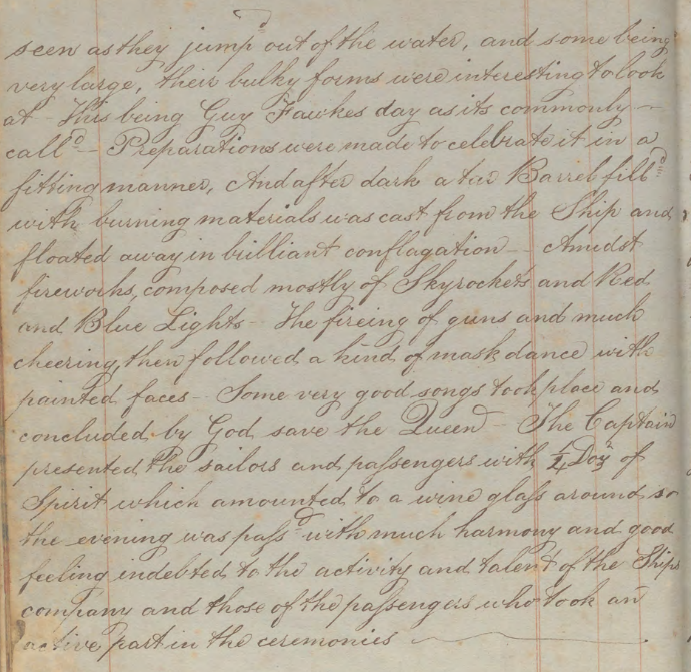
Transcription:
Seem as they jump* out of the water, and some being
Very large, their bulky forms were intersting to look
At – this being Guy Fawkes day as its commonly –
Call* – preparations were made to celebrate it in a
Fitting manner, and after dark a tar Bariel fill*
With burning materials was cast from the ship and
Floated away in brilliant conflagation – amidst
Fireworks, composed mostly of skyrockets and red
And blue lights – the fireing of guns and much
Cheering, then followed a kind of mask dance with
Painted faces – some very good songs took place and
Concluded by God save the Queen – The Captain
Presented the sailors and passengers with ¼ doz of
Spirit which amounted to a wine glass around so
The evening was pass* with much harmony and good
Feeling indebted to the activity and talent of the ships
Company and those of the passenger who took an
Active part in the ceremonies –
Ritual to the God Neptune, Monarch of the Deep
As the ship approached the equator line and began to experience the strong trade winds from the tropics, rituals began to take place in order to please the Neptune Monarch of the Deep. The Neptune Monarch was a Roman god of freshwater and is commonly known as Poseidon’s counterpart.
Ellis records that the men on the ship had to participate in a ritual of a sort to pass the Line safely. This consisted of lighting a tar barrel and throwing it into the sea to see if the Monarch was approaching, then shaving the heads and beards of all the men. They did this by leaning them over the bath, making sure they stayed conscious throughout the process by using smelling bottles from the doctor’s bag. Once this was completed, the men were then dunked in the sea head first. Then the night was filled with singing and dancing.

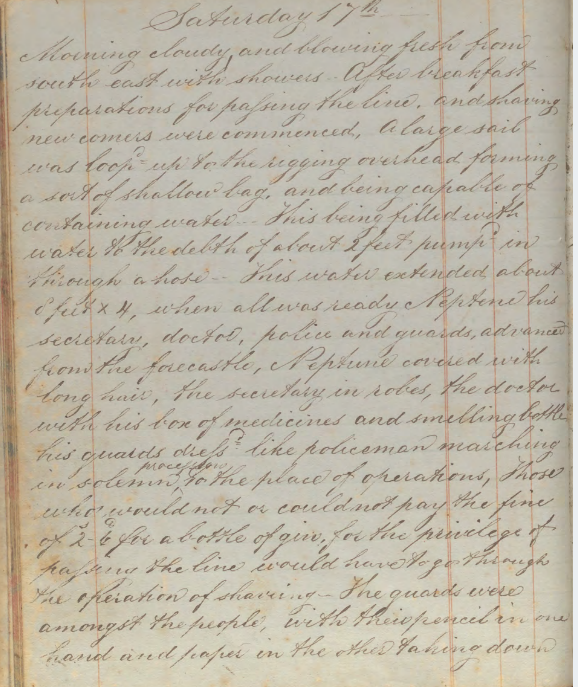
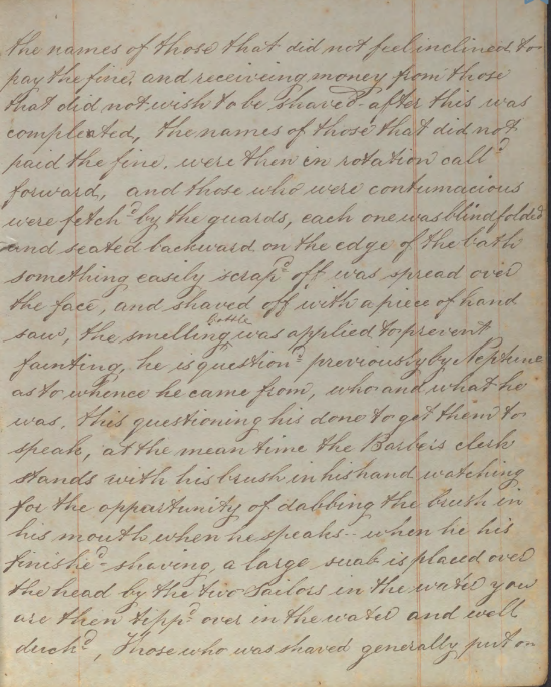

Transcription:
Friday 16th
Fine with the same steady breeze, we were making
Good speed, and all pleased with our progress –
In the evening we were told we had entered on the
Line – and about 8 O Clock in the evening two or
Three reports from fire arms – announced that –
Neptune the Monarch of the deep was –
Approaching – and shortly a voice up the ships
Bows told us he had arrived – but merely to –
Accquaint us we were on the high road of his
Teritories – and on tomorrow he should demand
His dues and receive those respects he was –
Entitled to and would undoubtedly be paid him
The event pass* off with a cheer and a flaming
Tar barrel, which appeared to float swiftly
Pass the ship burning bright enough to
Illuminate some miles distant, the evening
Was cooler than any we had for sometime
The wind being fresh and the sun cloudedSaturday 17th
Morning cloudy, and blowing fresh from
South east with showers – after breakfast
Preparations for passing the line, and sharing
New comers were commenced, a large sail
Was loop* up to the rigging overhead forming
A sort of shallow bag, and being capable of
Containing water – this being filled with
Water to the depth of about 2 feet pump* in
Through a hose – this water extended about
8 feet x 4, when all was ready Neptune his
secretary , doctor, police and guards, advanced
From the forecastle, Neptune covered with
Long hair, the secretary in robes, the doctor
With his box of medicines and smelling bottle
His guards dress* like policemen marching
In solemn process to the place of operations, those
Who would not or could not pay the fine
Of 2-6 for a bottle of gin, for the privilege of
Passing the line would have to go through
The operation of sharing – the guards were
Amongst the people, with their pencil in one
Hand and paper in the other taking downThe names of those that did not feel inclined to
Pay the fine, and receiving money from those
That did not wish to be shaved – after this was
Complemented, the names of those that did not
Paid the fine, were then in rotation call*
Forward, and those who were contumacious
Were fetch* by the guards, each one was blindfolded
And seated backwards on the edge of the bath
Something easily scrap* off was spead over
the face, and shaved off with a piece of hand
Saw, the smelling bottle, was applied to prevent
Fainting, he is question* preveiusly by Neptune
As to whence he came from, who and what he
Was, this questioning his done to get them to
Speak, at the mean time the Barbers clerk
Stands with his brush in his hand watching
For the opportunity of dabbing the brush in
His mouth when he speaks – when he his
Finshe* shaving, a large swab is placed over
The head by the two sailors in the water you
Are then tipp* over in the water and well
Dunk*, those who was shaved generally put onLight clothing, it being hot weather and
salt water there is little discomfort and
No danger in the process, putting on dry things
At once – one of the ladies remarked to one
That had been shaved, that she noticed
They drew their heads oneside when the
Smelling bottle was applyed, and she
Supposed the essenc if contain* was very
Strong, yes he replied it was, but its
Strength was a sharp pointed needle stuck
In the cork that made us draw our heads
Back, it pass* off with much merriment
For when all were shav* Neptune himself
Was well duck*, and his attendants mutually
Slush* each other in salt water, till the
Banks gave away and it escaped over the deck
In its native ocean, afterwards some songs
And dancing among the sailors finished
The day sport –
“Gigantic Colosseum or Temple” at the Bay of Biscay
Ellis mentions an interesting monument located in the Bay of Biscay, referring this magnificent architecture with having similar characteristics to a gigantic colosseum or temple. The location of what exactly he is describing has not been located, and further research is needed to identify location.

Transcription:
Monday 26th
Rather a cloudy morning with little wind it
Was fair forces, but of no power, moving very slow
The latter past of the day was fine, and the sun set
Somewhat grand, presenting the appearance of
Some gigantic colosseum or temple of magnificent
Architectural proportions festoon* in fleecy clouds
With a region of glorious light in the distance propecs
The Emigrants Song
One of the songs that the passengers sung is recorded in Ellis’ writings, it has thirteen verses and is called the Emigrants Song.



Transcription:
Emigrants song
A thousand miles form any land
On the deep blue mains eternal tide
Hear the song of the emigrants joival band
As over the waves they gaily rideWe are onward over the ocean bound
To the promis* land so free and fair
We* trace the earths vast qirdle round
And plant a home and a people thereWe’ve arms of nerve and hands of skill
Knowledge of what life weal requires
The firm indomitable will
And courage of our ancient siresWe’ll emulate their better charms
Devout magnanimous and brave
Rival their deeds of acts and arms
The fame their deeds and powers gaveThe minor tutord from his birth
To win with unerrign art and hand
The treasure of the wealthy earth
Disburting riches through the landTaught from our first industrial day
The forgesuse the engines power
To lead the flying iron away
Through mountain base over granite towerTo commerce train* in our native isles
we’ve led her over the worlds wide main
Were our sails are seen, there commerce smiles
We’ll aid her course and promote her reignHe vales shall yield nuturious grains
Well cultered by the plough
The browsing herds shall fill the plains
Flocks feed to the mountain browMay heaven upon our progress simle
Industry shine with work well wrought
Commerce be spotless of fraud or quite
And light for life healing value soughtOur labour science shill combin*
With probity will soon create
The happiness of human kind
The genious beautiful and greatThen courage now my hearts so bold
As in the prospect good appears
As faith keen eye the views unfold
And bright eyed hope the prospect cheersSo gaily on our course well steer
To the far off land so free and fair
We’ll trace the earths vast convex sphere
And falter not nor halt nor fear
But plant a home and an empire there
Ellis’ Final Entries
The last entry, written before the period of lost pages, was dated 30th November 1855.
There are four loose pages with no dates describing Tristan Da Cunha islands. Ellis spends quite a bit of time describing these islands in great detail, from the opportunities for cultivation, to the types of animals found.
He then goes on and mentions the expedition of the Blenden Hall, which was a ship launched in 1811 from Bursledon Hampshire, England, that then later wrecked on Inaccessible Island in 1821. He mentions Captain Anthony Greig by name and the ship’s wreck location.
A Simpathy
On the back of a torn crumbling page, he writes a sympathy, where he feels united with his fellow passengers from the experiences they have endured. He also acknowledges the challenges and pains of the journey.

Transcription:
Simpathy Thomas Ellis Jotues Devo…
To cheer the broken hearted To breath the thoughts…
To weep with those that weep To offer the same pure…
To comfort those who’ve parted To live with all as brothers
From friends across the deep That virtue – ah! too…
to sing the songs of joyfulness Such are the works of…
…those that joyful are To suffer with and for
…then in sorrows fulness And on the wounds it…
…to shed the parting tear A soothing balm to pains…
Ellis’ Australian Arrival
The last couple of pages entail the last leg of the journey, passing Van Diemen’s land, commonly known as Tasmania, as well as the long-awaited arrival to Sydney, NSW. Thomas Ellis finally arrived in Sydney on the 25th-26th of January 1856, once he set foot on land his diary entries cease. We are left on a cliffhanger, all we know is that Ellis landed in Sydney on the 26th and the ship continued to travel up the Hunter River to Newcastle.
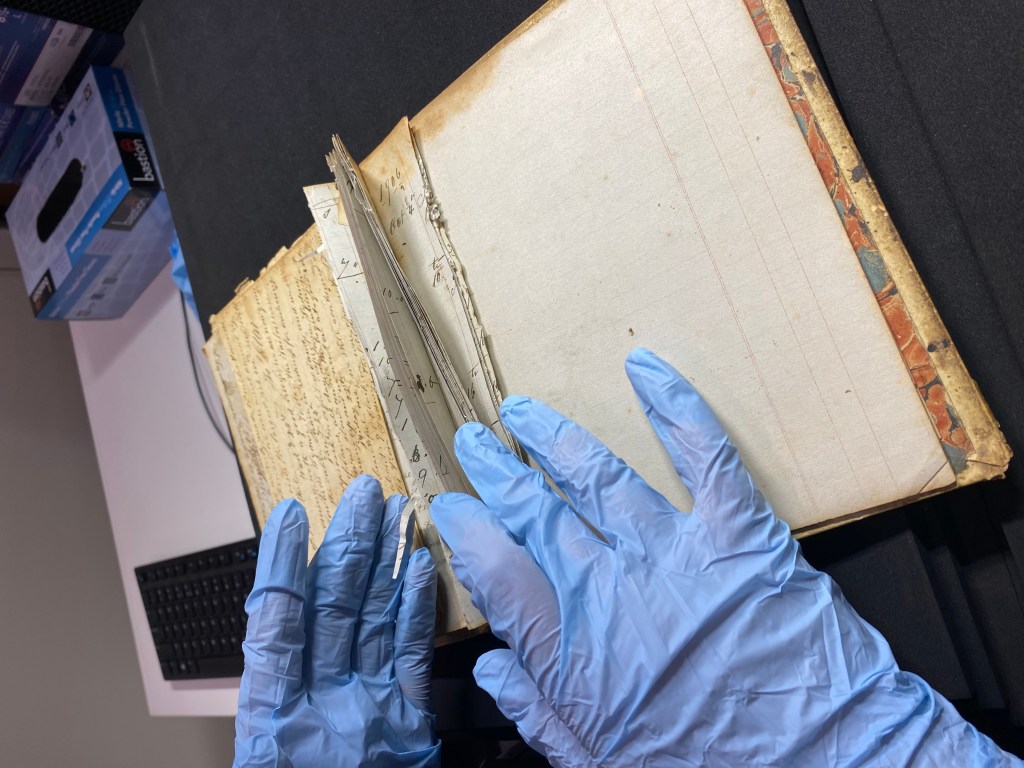
Further Research
We have found mentions of Captain Fowler and the ship Joshua in a newspaper article on Trove from the 26th of January 1856, in the ‘Ships Mails’ Sydney Morning Herald (26 January 1856) which describes the journey of the ship and other events worth mentioning.
We are still searching for links to family members and confirmation of dates of birth, we have found another newspaper on Trove that mentions the death of Mr T. J Ellis who was born in Devonshire and came to Australia about 70 years ago. This description vaguely matches Thomas Ellis who wrote this diary, however, we are unable to confirm that is in fact him. See “Death of Mr T.J Ellis, Sen.” (Singleton Argus, 4 Aug 1921)
If you have further knowledge about this diary or anything about the contents, please make an inquiry to the Special Collections team at the Auchmuty Library, or leave a comment below.
Transcribed and Researched by University of Newcastle Bachelor of Arts student, Leah Madigan

Provenance
When quizzed about who could possibly have written the Diary, Leah began looking for clues. She began with the ship the Joshua and its commander Captain Fowler, and located the crew and passenger list for the voyage:

One name, corresponding to one of the passengers on the list, and mentioned in the Diary was also found on the inside fly leaf at the end of the Diary, discreetly in one of the blue marbled circles; Thomas Ellis.
![Inside marbled board, with "Thomas Ellis" signature in ink. [A5609 (v) Diary of a voyage from London to Sydney direct, Joshua [ship]. Captain Fowler Commander, 1855. [Author Thomas Ellis] donated by Mr. and Mrs. D. Morrison.]](https://hunterlivinghistories.com/wp-content/uploads/2023/10/IMG_4142-rotated-e1698810632890-1024x978.jpg)
An obituary to a “T.J. Ellis” in the Singleton Argus who arrived in Australia in the 1850s assists in also connecting the provenance through the donors, the Morrison’s, who ran the Store in John Street Singleton.
The “T.J. Ellis” of the obituary spent the last years of his life, with his daughter, living in John Street, and so it is very plausible that (if “T.J.” is our Thomas”) some of his personal effects might have made their way into their possession, later to be donated to the University of Newcastle, with many other historical archives, sometime in the period of the late 1970s.
But it is always exciting to uncover further evidence and confirm the speculation. So, anyone with further information, or wishing to investigate further, please let get in touch, and continue the path of discovery.
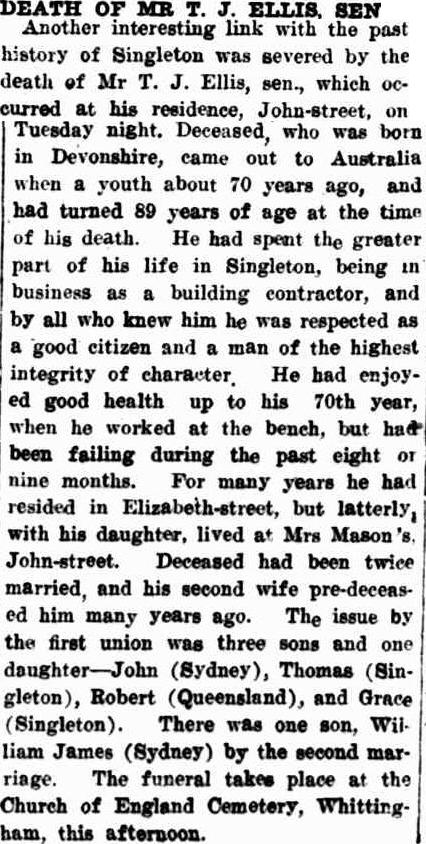
If you are a student and would like undertake a Career Ready Placement with us contact Dr Ann Hardy
Wonderful information ….all the Ellises in Newcastle should look at this to see whether or not they are related to those mentioned. Our family knew a mr and mrs Reg Ellis ( who worked with my Dad) and their son was John and daughter Lorraine. I just wonder whrther there is any connection …?
The Maitland Mercury records the journey to be uneventful, except for the icebergs south of Africa. see https://trove.nla.gov.au/newspaper/article/18642871
What a great discovery and with this work the further questions it has unearthed can be found. Well written blog and discover piece as well by Leah and those who supported her in this endeavour.
There are numerous Thomas Ellis . The obituary seems to be inconsistent with the character revealed by the diary… a building contractor ?? I could accept the diary could be someone who went on to be a journalist or a lawyer, or a writer.